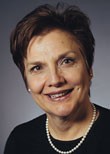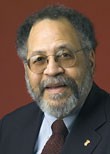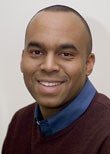New faculty institute aims to enrich the university's teaching of diversity
By Roger Segelken
A year from now Cornell students might be surprised to find themes of diversity and inclusion woven into curricula of the most unlikely courses – physical science classes, for example.
The inaugural Cornell Faculty Institute for Diversity is set for June 1-4, 2008, at a conference facility near Canandaigua, N.Y. Organizers in the university's Diversity Council and the Center for Learning and Teaching hope that institute participants will return to Ithaca prepared to incorporate elements of diversity into new or existing courses in their diverse disciplines – be they the arts and humanities or even the biological, physical and social sciences.
"This institute is not for professors, lecturers and instructors who already have made diversity a focus of their teaching -- although we certainly applaud their initiative," explains Helene Selco, director of the Center for Learning and Teaching and chair of the organizing committee of the summer institute. "Rather, we are looking for Cornell's teachers who care passionately about diversity issues but never before found a way to share that knowledge with students in their particular disciplines."
The June institute is one of four initiatives being implemented by the university based on recommendations from the 2006 Teagle Foundation study called "Eliminating Racial and Ethnic Disparities in College Completion and Achievement: What Works and Why." That 18-month study was led by Cornell and involved four neighboring institutions: Colgate University, Hamilton College, Hobart and William Smith Colleges and Wells College. (The other initiatives at Cornell are called Breaking Bread, Feedback and Equity Scorecard.)
The faculty institute is modeled on a successful program at Hamilton College, according to Cornell President David J. Skorton, who appealed in an invitation to all teaching personnel to "... consider additional ways in which you can foster an awareness of diversity issues in your teaching and in your interactions with students and colleagues." Support for diversity and inclusion "is an important priority for me personally and for Cornell," the president added.
From a field of applicants, 15 to 20 will be selected to participate in the summer institute, where the guest facilitator will be Johnella E. Butler, provost and vice president of academic affairs at Spelman College. Cornell's Ron (Ronald) Harris-Warrick, professor of neurobiology and behavior, will assist in developing the institute from his perspective as a member of the Cornell faculty. Robert L. Harris Jr., vice provost for diversity and faculty development, is a co-organizer of the institute.
The teaching center's Selco anticipates follow-up get-togethers for participants of the 2008 institute, she said, and the institute may become an annual event. Although students are asking for more diversity themes in all kinds of disciplines, they should not expect radical curricular revisions in the fall 2008 course roster, Selco said. "We're breaking new ground, in many cases, and something this important takes time to deliberate and to find the very best way," she said.
The Breaking Bread initiative aims to bridge the perceived divides between student organizations that represent various racial, gender, national and political constituencies with the one thing everyone needs: food. Pairs of organizations that intend to conduct collaborative projects begin by collaborating on a joint dinner – from planning the menu to shopping for ingredients, cooking and serving, and washing the dishes together. Sometime before the tables are cleared, it is hoped, planning for the next collaborative project will commence.
"It is our expectation that in the process of planning, preparing and eating a meal together, student groups that tend not to work together will discover commonalities," said Cornell Deputy Provost David R. Harris. "Participants will begin to understand the perspectives and experiences of people different from themselves, and further develop skills necessary for living and working in increasingly diverse communities."
No dinner, just insightful food for thought, is the product of the Feedback program, which invites Cornell students, faculty and staff members to share personal experiences that made them feel either "welcome" or "unwelcome" in the campus community. The goal of the program is to stimulate ongoing conversation about diversity and improve the campus climate. Select submissions to an e-mail address (feedbackprogram@cornell.edu) will be published, anonymously, in the Cornell Daily Sun. Feedback program participants are encouraged to complete both of the following sentences: "I feel like a full member of the Cornell community because ..." and "I do not feel like a full member of the Cornell community because ..."
The fourth initiative to arise from the Teagle Foundation study, Equity Scorecard, originally was developed at the University of Southern California's Center for Urban Education. Data are collected to address four dimensions in the educational outcomes of underserved and/or underrepresented students in higher education: access, excellence, retention and institutional receptivity. If implemented and disseminated annually, an institution's Equity Scorecard gives students, faculty and staff members, and administrators a way to monitor and measure progress in reaching diversity goals.
Media Contact
Get Cornell news delivered right to your inbox.
Subscribe

